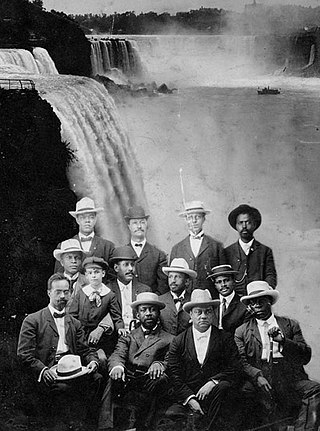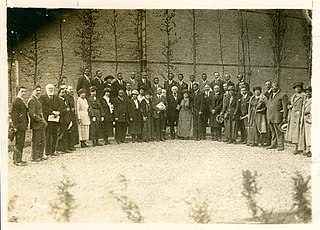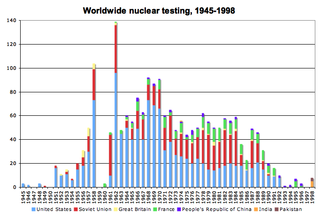Related Research Articles

Nuclear disarmament is the act of reducing or eliminating nuclear weapons. Its end state can also be a nuclear-weapons-free world, in which nuclear weapons are completely eliminated. The term denuclearization is also used to describe the process leading to complete nuclear disarmament.

William Edward Burghardt Du Bois was an American sociologist, socialist, historian, and Pan-Africanist civil rights activist.

The Niagara Movement (NM) was a civil rights organization founded in 1905 by a group of activists—many of whom were among the vanguard of African-American lawyers in the United States—led by W. E. B. Du Bois and William Monroe Trotter. The Niagara Movement was organized to oppose racial segregation and disenfranchisement. Its members felt "unmanly" the policy of accommodation and conciliation, without voting rights, promoted by Booker T. Washington. It was named for the "mighty current" of change the group wanted to effect and took Niagara Falls as its symbol. The group did not meet in Niagara Falls, New York, but planned its first conference for nearby Buffalo. The Niagara Movement was the immediate predecessor of the NAACP.

William Monroe Trotter, sometimes just Monroe Trotter, was a newspaper editor and real estate businessman based in Boston, Massachusetts. An activist for African-American civil rights, he was an early opponent of the accommodationist race policies of Booker T. Washington, and in 1901 founded the Boston Guardian, an independent African-American newspaper he used to express that opposition. Active in protest movements for civil rights throughout the 1900s and 1910s, he also revealed some of the differences within the African-American community. He contributed to the formation of the National Association for the Advancement of Colored People (NAACP).

The Pan-African Congress (PAC) is a regular series of meetings which first took place on the back of the Pan-African Conference held in London in 1900.

The World Peace Council (WPC) is an international organization created in 1949 by the Cominform and propped up by the Soviet Union. Throughout the Cold War, WPC engaged in propaganda efforts on behalf of the Soviet Union, whereby it criticized the United States and its allies while defending the Soviet Union's involvement in numerous conflicts.

Shirley Graham Du Bois was an American-Ghanaian writer, playwright, composer, and activist for African-American causes, among others. She won the Messner and the Anisfield-Wolf prizes for her works.
The American Crusade Against Lynching (ACAL) was an organization created in 1946 and headed by Paul Robeson, dedicated to eliminating lynching in the United States. A strong advocate of the Civil Rights Movement, Robeson believed "a fraternity must be established in which success and achievement are recognized and those deserving receive the respect, honor and dignity due them." In his speech "The New Idealism", delivered as a Rutgers College valedictory address, Robeson supported the idea that all – both colored and white people – need to take part in the creation of the new "American Idealism"; which led to the development of the American Crusade Against Lynching.

The Stockholm Appeal was an initiative launched by the World Peace Council on 19 March 1950 to promote nuclear disarmament and prevent atomic war.
Anti-nuclear organizations may oppose uranium mining, nuclear power, and/or nuclear weapons. Anti-nuclear groups have undertaken public protests and acts of civil disobedience which have included occupations of nuclear plant sites. Some of the most influential groups in the anti-nuclear movement have had members who were elite scientists, including several Nobel Laureates and many nuclear physicists.

The anti-nuclear movement in the United Kingdom consists of groups who oppose nuclear technologies such as nuclear power and nuclear weapons. Many different groups and individuals have been involved in anti-nuclear demonstrations and protests over the years.

A peace movement is a social movement which seeks to achieve ideals such as the ending of a particular war or minimizing inter-human violence in a particular place or situation. They are often linked to the goal of achieving world peace. Some of the methods used to achieve these goals include advocacy of pacifism, nonviolent resistance, diplomacy, boycotts, peace camps, ethical consumerism, supporting anti-war political candidates, supporting legislation to remove profits from government contracts to the military–industrial complex, banning guns, creating tools for open government and transparency, direct democracy, supporting whistleblowers who expose war crimes or conspiracies to create wars, demonstrations, and political lobbying. The political cooperative is an example of an organization which seeks to merge all peace-movement and green organizations; they may have diverse goals, but have the common ideal of peace and humane sustainability. A concern of some peace activists is the challenge of attaining peace when those against peace often use violence as their means of communication and empowerment.
What came to be known as the Atlanta Compromise stemmed from a speech given by Booker T. Washington, president of the Tuskegee Institute, to the Cotton States and International Exposition in Atlanta, Georgia, on September 18, 1895. It was first supported and later opposed by W. E. B. Du Bois and other African-American leaders.
The Soviet Peace Committee was a state-sponsored organization responsible for coordinating peace movements active in the Soviet Union. It was founded in 1949 and existed until the fall of the Soviet Union in 1991.

The application of nuclear technology, both as a source of energy and as an instrument of war, has been controversial.

Gerald Horne is an American historian who holds the John J. and Rebecca Moores Chair of History and African American Studies at the University of Houston.

The Brownies' Book was the first magazine published for African-American children and youth. Its creation was mentioned in the yearly children's issue of The Crisis in October 1919. The first issue was published during the Harlem Renaissance in January 1920, with issues published monthly until December 1921. It is cited as an "important moment in literary history" for establishing black children's literature in the United States.

The Campaign for Nuclear Disarmament (CND) is an organisation that advocates unilateral nuclear disarmament by the United Kingdom, international nuclear disarmament and tighter international arms regulation through agreements such as the Nuclear Non-Proliferation Treaty. It opposes military action that may result in the use of nuclear, chemical or biological weapons, and the building of nuclear power stations in the UK.

Nina Gomer Du Bois was an American civil rights activist, Baháʼí Faith practitioner, and homemaker. She served on the executive committee of the Women's International Circle of Peace and Foreign Relations in 1927, which was largely responsible for organizing the fourth Pan-African Congress in New York. Du Bois was the first wife of civil rights activist W.E.B. Du Bois and the mother of the educator Yolande Du Bois.
References
- Schneider, Paul (2001), "Peace Movement", in W. E. B. Du Bois: An Encyclopedia, Gerald Horne and Mary Young (Eds.), Greenwood, ISBN 978-0-313-29665-9.
- Lewis, David Levering, (2009), W.E.B. Du Bois: A Biography, Henry Holt and Co. Single volume edition, updated, of his 1994 and 2001 works. ISBN 978-0-8050-8769-7.